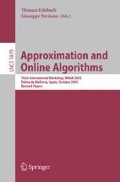Abstract
In this paper we consider the network design for selfish users problem, where we assume the more realistic unsplittable model in which the users can have general demands and each user must choose a single path between its source and its destination. This model is also called atomic (weighted) network congestion game. The problem can be presented as follows : given a network, which edges should be removed to minimize the cost of the worst Nash equilibrium?
We consider both computational issues and existential issues (i.e. the power of network design). We give inapproximability results and approximation algorithms for this network design problem. For networks with linear edge latency functions we prove that there is no approximation algorithm for this problem with approximation ratio less then \((3+\sqrt{5})/2 \approx 2.618\) unless P=NP. We also show that for networks with polynomials of degree d edge latency functions there is no approximation algorithm for this problem with approximation ratio less then \(d^{{\it \Theta}(d)}\) unless P=NP. Moreover, we observe that the trivial algorithm that builds the entire network is optimal for linear edge latency functions and has an approximation ratio of \(d^{{\it \Theta}(d)}\) for polynomials of degree d edge latency functions. Finally, we consider general continuous, non-decreasing edge latency functions and show that the approximation ratio of any approximation algorithm for this problem is unbounded, assuming P ≠ NP. In terms of existential issues we show that network design cannot improve the maximum possible bound on the price of anarchy in the worst case.
Previous results of Roughgarden for networks with n vertices where each user controls only a negligible fraction of the overall traffic showed optimal inapproximability results of 4/3 for linear edge latency functions, \({\it \Theta}(d /{\rm ln} d)\) for polynomial edge latency functions and n/2 for general continuous non-decreasing edge latency functions. He also showed that the trivial algorithm that builds the entire network is optimal for that case.
Research supported in part by the German-Israeli Foundation.
Access this chapter
Tax calculation will be finalised at checkout
Purchases are for personal use only
Preview
Unable to display preview. Download preview PDF.
References
Awerbuch, B., Azar, Y., Epstein, A.: The price of routing unsplittable flow. In: Proc. 37th ACM Symp. on Theory of Computing (to appear, 2005)
Beckmann, M., McGuire, C.B., Winsten, C.B.: Studies in Economics of Transportation. Yale University Press, New Haven (1956)
Braess, D.: Uber ein paradoxon der verkehrsplanung. Unternehmensforschung 12, 258–268 (1968)
Christodoulou, G., Koutsoupias, E.: The price of anarchy of finite congestion games. In: Proc. 37th ACM Symp. on Theory of Computing (to appear, 2005)
Czumaj, A., Krysta, P., Vöcking, B.: Selfish traffic allocation for server farms. In: Proc. 34th ACM Symp. on Theory of Computing, pp. 287–296 (2002)
Czumaj, A., Vöcking, B.: Tight bounds for worst-case equilibria. In: Proc. 13rd ACM-SIAM Symp. on Discrete Algorithms, pp. 413–420 (2002)
Dubey, P.: Inefficiency of nash equilibria. Mathematics of Operations Research 11(1), 1–8 (1986)
Fortune, S., Hopcroft, J.E., Wyllie, J.C.: The directed subgraph homeomorphism problem. Theoretical Computer Science 10(2), 111–121 (1980)
Fotakis, D., Kontogiannis, S., Spirakis, P.: Selfish unsplittable flows. In: Díaz, J., Karhumäki, J., Lepistö, A., Sannella, D. (eds.) ICALP 2004. LNCS, vol. 3142, pp. 593–605. Springer, Heidelberg (2004)
Koutsoupias, E., Papadimitriou, C.H.: Worst-case equilibria. In: Proc. 16th Symp. on Theoretical Aspects of Comp. Science, pp. 404–413 (1999)
Mavronicolas, M., Spirakis, P.: The price of selfish routing. In: Proc. 33rd ACM Symp. on Theory of Computing, pp. 510–519 (2001)
Murchland, J.D.: Braess’s paradox of traffic flow. Transportation Research 4, 391–394 (1970)
Garey, M.R., Johnson, D.S.: Computers and Intractabilty: A Guide to the Theory of NP-Completeness. Freeman, New York (1979)
Nash, J.F.: Equilibrium points in n-person games. In: Proceedings of National Academy of Sciences, vol. 36, pp. 48–49 (1950)
Owen, G.: Game Theory, 3rd edn. Academic Press, London (1995)
Papadimitriou, C.H.: Algorithms, games and the internet. In: Proc. 33rd ACM Symp. on Theory of Computing, pp. 749–753 (2001)
Rosenthal, R.W.: A class of games possesing pure-strategy nash equilibria. International Journal of Game Theory 2, 65–67 (1973)
Roughgarden, T.: Designing networks for selfish users is hard. In: Proc. 42nd IEEE Symp. on Found. of Comp. Science, pp. 472–481 (2001)
Roughgarden, T.: The price of anarchy is independent of the network topology. In: Proc. 34th ACM Symp. on Theory of Computing, pp. 428–437 (2002)
Roughgarden, T.: The maximum latency of selfish routing. In: Proc. 15th ACM-SIAM Symp. on Discrete Algorithms, pp. 973–974 (2004)
Roughgarden, T., Tardos, É.: How bad is selfish routing. In: Proc. 41st IEEE Symp. on Found. of Comp. Science, pp. 93–102 (2000)
Author information
Authors and Affiliations
Editor information
Editors and Affiliations
Rights and permissions
Copyright information
© 2006 Springer-Verlag Berlin Heidelberg
About this paper
Cite this paper
Azar, Y., Epstein, A. (2006). The Hardness of Network Design for Unsplittable Flow with Selfish Users. In: Erlebach, T., Persinao, G. (eds) Approximation and Online Algorithms. WAOA 2005. Lecture Notes in Computer Science, vol 3879. Springer, Berlin, Heidelberg. https://doi.org/10.1007/11671411_4
Download citation
DOI: https://doi.org/10.1007/11671411_4
Publisher Name: Springer, Berlin, Heidelberg
Print ISBN: 978-3-540-32207-8
Online ISBN: 978-3-540-32208-5
eBook Packages: Computer ScienceComputer Science (R0)

